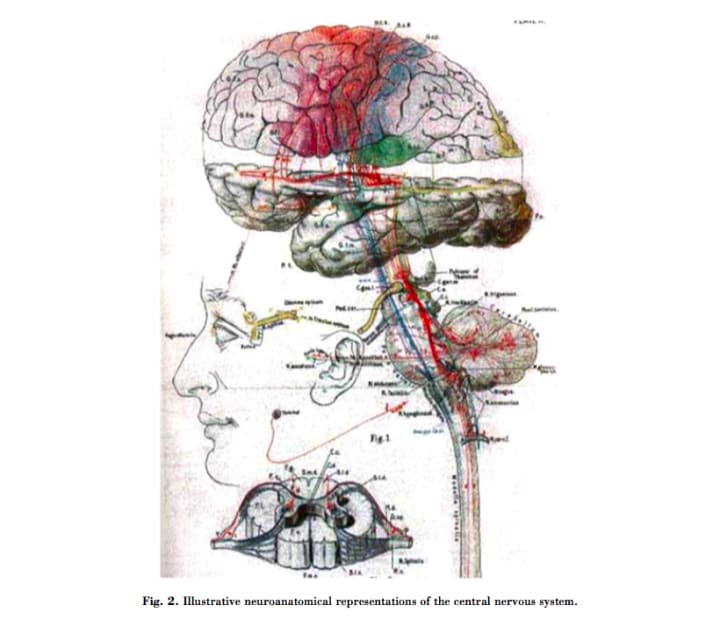500,000 years ago,
The clan heads home after a long day of labor. I lag behind, tired. Every step feels heavier than the last. My cousin turns around and yells for me to hurry up.
One day I will grow the strongest legs and walk faster than the rest.
A beautiful winged creature dancing through the air appears out of nowhere. Never have I seen such beauty and finesse. The shades on its wings seem outer worldly. I stray from my path through the trees and vines in awe.
I come back to my senses, alone, far from the rest of the clan. Nothing seems familiar. I scream for help, nobody answers. The silence wakes me up. My thoughts sharpen. The hairs on my neck and arms rise. The thump within beats faster than ever before.
A branch cracks. I turn and see the beast licking its lips, crouched down, ready to pounce. Thoughts go silent, and both legs take over as if they had belonged to somebody else. I run for my life, fast.
The animal gets closer with every stride. I can almost feel the warmth of its breath sending shivers through my body. A second-wind kicks in, which gives me some distance, until the edge of a cliff ends my race. I am trapped, helpless. The choice is mine: either I jump down the terrifying height or face the hungry predator.
I look down and feel sick to my stomach. My thoughts hold me back. The beast slows its pace and starts walking towards me, elated by the sight of its prey. I see large, sharp fangs and two dark slits locked directly onto my soul.
A loud shout echoes from afar and distracts the animal for an instant. Father appears out of the forest, spear in hand, followed closely by my cousin and my sister.
The beast recoils, but three sharp stones pierce through the furred skin as it collapses onto the grass. The fear within fades, but I still tremble. Father wraps me in his mighty arms, relieved, then puts you on his shoulder. I fall asleep flat on my face immediately, safe, as the sun sets over the mountains.
A Crisis Emerges

The Rise of Loneliness
A new threat emerges out of the 21st century. Loneliness and social isolation become a greater risk to the species than chronic diseases, and the crisis is only getting started. Twenty to forty percent of Americans wake up feeling lonely according to the director of the University of Chicago’s Center for Cognitive and Social Neuroscience John Cacioppo.
"Loneliness is like an iceberg, we are conscious of the surface, but there is a great deal more that is phylogenetically so deep that we cannot see it, " he told Tim Adams from The Guardian during an interview released in 2016.
Cacioppo is no stranger to the effects and causes of loneliness. He collaborated on several studies to explore the growing phenomenon over the last twenty-one years.
"When you allow for all the other factors, you find that chronic loneliness increases the odds of an early death by 20%, which is about the same effect as obesity, though obesity does not make you as miserable as loneliness. "
Professor of psychology at Brigham Young University Julianne Holt-Lunstad analyzed an excess of studies from all over the world involving over 3.7 million subjects. She presented her research at the 125th Annual Convention of the American Psychological Association at the dawn of August 2017:
"There is robust evidence that social isolation and loneliness significantly increase the risk of premature mortality, and the magnitude of the risk exceeds that of many leading health indicators," she revealed. (Science Daily)
Move over poor nutrition; loneliness is about to fuck shit up.
What happens to your brain when you get lonely?

Cacioppo and his team used fMRI scans to answer the question in a 2009 study published in the Perspectives on Psychological Science journal.
Participants looked at pleasant and revolting pictures of things ranging from human conflict to misery, happy people, and even money as the MRI gathered the data. Researchers noticed differences in the brain activity of two specific regions.
The ventral striatum is an area linked with reward that gets activated by things such as food and money. Satisfied subjects had greater activation of this region crucial for learning than their lonely counterparts when shown fun pictures. Imagine a dull feeling when looking at an image of your favorite meal or a fat stack of cash.
Activity in the temporoparietal junction which regulates one's ability to grasp another person's perspective was also weaker amongst lonelier participants when shown humans in unpleasant settings, an utter lack of sensation at the sight of misery.
Now, does loneliness change the brain, or is the other way around? More research will be necessary to grasp the between mental health and social interactions.
Loneliness and Your Sleep
Sleep is another critical aspect of optimal health affected when you get lonely. A 2017 study from King's College London published in Psychological Medicine examined the link on 2,000 young British adults. The impact of loneliness amongst older adults is well-known, but the youth suffers just as much, if not more.
"Diminished sleep quality is one of the many ways in which loneliness gets ‘under the skin,' and our findings underscore the importance of early intervention to reduce loneliness in young people, which may be the starting point for a cascade of physical health problems in later life, " concluded the analysis. (Scientific Reports)
An omnipresent fear of helplessness could be a potential factor based on the greater pertinence amongst subjects exposed to several forms of violence ranging from crime to sex and violent abuse or mistreatment in the past, although further research will be needed to confirm anything.

Exacerbating effect of violent victimization in adolescence and maltreatment in childhood on the association between loneliness and sleep quality in young adulthood. Higher scores on the vertical axis reflect poorer sleep quality. Source
Body Breakdown
The helpless theory justifies the heightened stress response observed in other loneliness studies such as another one published by John Cacciopo in 2005, where 5-year college students had a weakened immune response to a flu shot.
The body's defense system breaks down. Rice University researchers noted greater symptom severity amongst lonely subjects given a cold for the study compared to a control group. These findings are alarming for the elderly for whom sickness poses a potentially fatal risk.
Loneliness is even contagious according to Cacioppo.
"We detected an extraordinary pattern of contagion that leads people to be moved to the edge of the social network when they become lonely," (NYDaily News)
The crisis is bound to affect you sooner than later. Loneliness does not necessarily need solitude to manifest, remember. You may be part of a sports team or any other group yet still feel alone in the world. Someone close like your spouse of neighbor may suffer under the radar for fear of drawing negative attention because of the old stigma regarding mental health.
Reversing the epidemic will be no easy task, there is no doubt. How could anyone overcome an underactive brain activity in the regions that regulate motivation and empathy? The healing process will be like swimming against the tide.
One potential solution to regulate loneliness could be gathering insight about yourself using the third person instead of the first. Michigan Researchers concluded the strategy to be a mentally effortless way to control emotions in an August 2017.
The results published in the journal Scientific Reports showed fMRI scans of subjects viewing disturbing images or recalling negative events from the past. Subjects experienced greater activity in the brain region associated with emotional regulation when speaking about themselves in the third person.
This method could offset the sub par ventral striatum activation experienced amongst Cacioppo's lonely subjects and generate new energy otherwise wasted on unregulated emotions.
" Across two neuroscience modalities and two different emotion elicitation procedures, the current findings suggest that third-person self-talk facilitates emotional control without recruiting cognitive control. "
Possible questions include:
- How is [Insert name here] doing today?
- Why is [Insert name here] feeling lonely?
- How long has [ Insert name here] been feeling like this?
- Did [Insert name here] experience some form of violence in the past?
- What makes [Insert name here] afraid?
- What makes [Insert name here] grateful?
Pay attention to what your mind has to say. The inherent noise ever so present in today's modern age often blurs communications between the body and its operating system. Meditation is a reliable tool to enhance your listening ability and learn to cleave emotions from thoughts. A ten-minute daily habit can significantly impact the quality of your life.
Meditation and third-person monologues will help you observe the thought train running through your mind and gather crucial insight on who you are. The peace of mind allows bright ideas to fuel action.
Other creative strategies against the growing epidemic include the rent-free housing program for university students who spend a minimum of thirty hours with a nursing home resident every week, such as the one offered in the Netherlands. The project started two years ago.
Student Nursing Home

" Officials at the nursing home say students do a variety of activities with the older residents, including watching sports, celebrating birthdays and, perhaps most importantly, offering company when seniors fall ill, which helps stave off feelings of disconnectedness. " (PBS)
Students can focus on their studies without having to work crazy hours just to make rent and tuition while providing a service that can change someone's last moments on this planet for the better. The experience will spark the sense of purpose sought by young adults as they step into the real world for the first time.
Evolution 3.0
Investments to create more of these initiatives and advance the science of loneliness will be crucial in the decades to come. Times changes fast, and the species must have all the tools at hand to adapt and survive.
Innovation took us from water onto land, up trees, then out of caves to build cities. This evolutionary capacity is hard wired within our cells after years of thriving through an unforgiving nature, where new enemies rose at every level to push our ancestors out of their comfort zones.
The world remains a hostile environment; Greed fuels war, hatred murders while disease persists, yet we find ourselves another turning point. Mobile technology links the world like never before in recorded history. There is a wealth of knowledge and experiences at your disposable through a pocket sized device connected to a worldwide invisible network.
The power is in our hands to rewire our legacy and build a new human that can thrive socially and in solitude, free of vestigial fear from the past. Health professionals and affected individuals must work together as a team to overcome the barriers preventing evolution.
Self-awareness is the best place to start. One must know where they stand to make the right decision. You must put the oxygen mask on first before helping others as the plane crashes, the same goes for loneliness. Save yourself, and the rest will follow.
There is hope for all the lonely heroes out there fighting their way through this mad world. You are far from alone; your body and mind are the greatest friends you will ever need if you take a moment to listen to what they have to say. They know more about yourself than you might think.
Find the path in life that warms your heart and lights up your mind and let passion guide you to a unique destination. Nobody else in the world can show you the way; only you can manifest the extraordinary universe ticking inside.
Reading List:
Science Daily - Loneliness in young adults linked to poor sleep quality
Science Daily - Social isolation, loneliness could be greater threat to public health than obesity
Science Daily- Loneliness Affects How The Brain Operates
Bad cold? If you're lonely, it may feel worse
Psychological Medicine Publication
John Cacioppo The Guardian interview
Loneliness is contagious and can spread like the flu, research finds
Perspective on Psychological Science Publication
Third-person self-talk facilitates emotion regulation without engaging cognitive control
About the Creator
Alex C-B
Pieces of myself through facts and fiction - A fallible human of the digital era. I bought the ticket, missed the ride, then tripped down the rabbit hole and woke up stranded with you in this strange matrix.






Comments
There are no comments for this story
Be the first to respond and start the conversation.